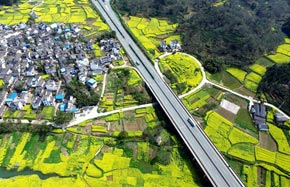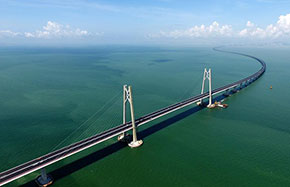China targets polluters with judicial action
(Xinhua) Updated: 2013-06-19 10:11In one major pollution case publicized late Tuesday by the supreme court, the board chairman of an industrial and trade company based in southwestern China's Yunnan province received four years in prison and a fine of 300,000 yuan ($48,960) for his company releasing untreated arsenic-tainted wastewater into a local pond between 2005 and 2008.
According to the court, the consequence of the case was deemed "especially severe" as the release contaminated nearby water sources and rendered them unusable for local towns, resulting in economic losses worth millions of yuan.
Two more principals with the company each got three years and a fine of 150,000 yuan. The firm was fined 16 million yuan, according to the supreme court. More than 10 million hectares of farmland are polluted and heavy metals and pesticide residue that people ingest through food have greatly threatened public health, said Qian Guanlin, a senior national political advisor.
"Environmental pollution is a major reason for the high incidence of cancer in China," said Qian, vice director of the population, resources and environmental committee under the National Committee of the Chinese People's Political Consultative Conference.
Also on Tuesday, the Ministry of Public Security announced that police have detained 118 suspects involved in environmental pollution cases since January.
Police said most of the cases involved mines or petrochemical factories, including a number of large factories that pay significant taxes and thus have a great deal of support from local governments.
The new judicial explanation also targets organizations that are involved in polluting, said Sun Jungong, a supreme court spokesman.
Organizations can cause much worse environmental consequences than individuals if they do not abide by the law, Sun said.
The new document states that executives and other people directly responsible for an organization's polluting activities will be treated as individual offenders and the organization will be fined.
At a study session held with members of the Political Bureau of the Communist Party of China (CPC) Central Committee in late May, President Xi Jinping pledged that China will not sacrifice the environment for temporary economic growth.
Last week, the State Council, or China's cabinet, adopted a set of measures to counter air pollution, including restraining energy-consuming and polluting industries, transforming the country's energy structure and enhancing the transparency of environment-related government information.
- Chinese firms win $11.6b buyout bid for Singaporean logistics firm
- Firm Chinese domestic demand continues to fuel Malaysian trade: economists
- China's genomics company BGI makes stock market debut
- German fintech startup Naga finalizes IPO
- China takes new steps to defuse local debt risks
- Mixing business with pleasure: 5 entrepreneurs motivated by their passion
- Australian CFOs, economists confident in China's financial outlook
- Chinese tourism continues to boost Australian economy: Economist


















